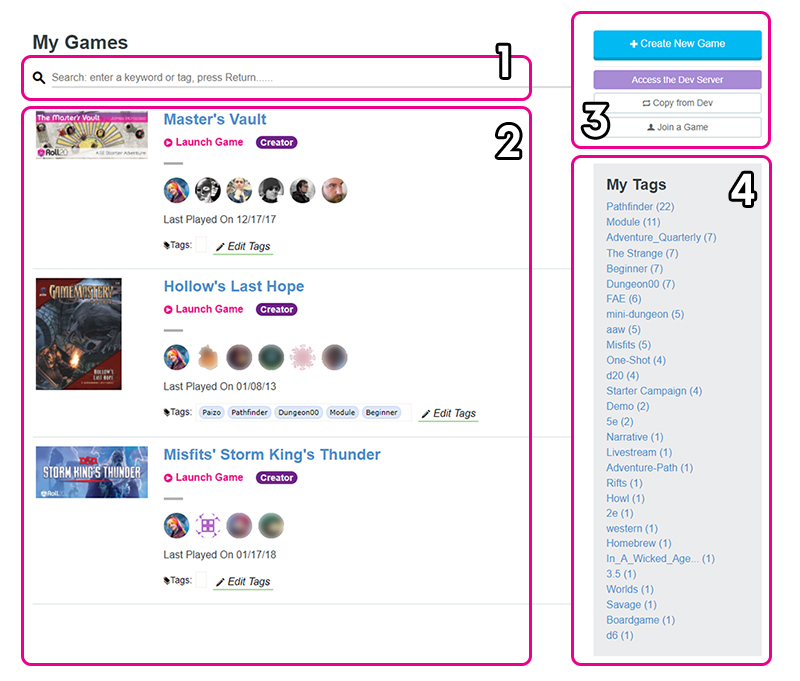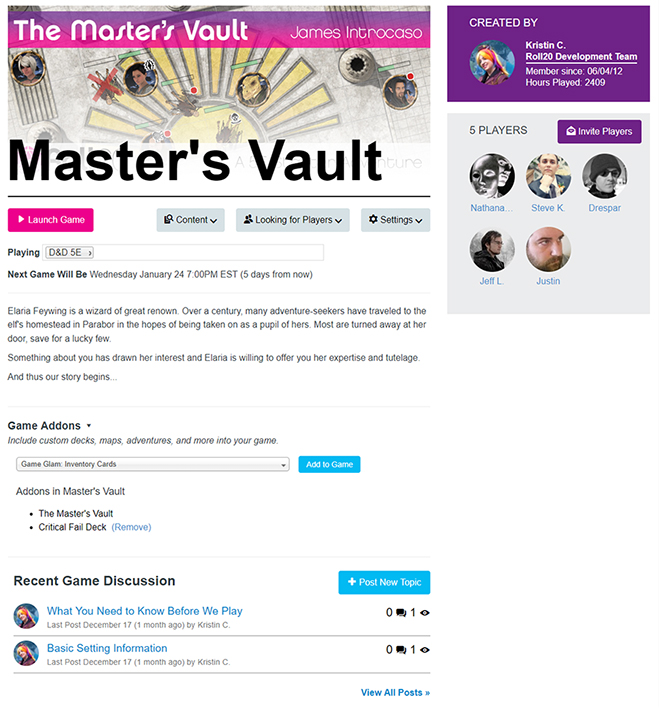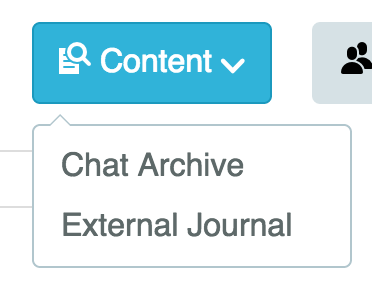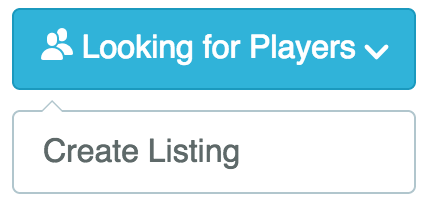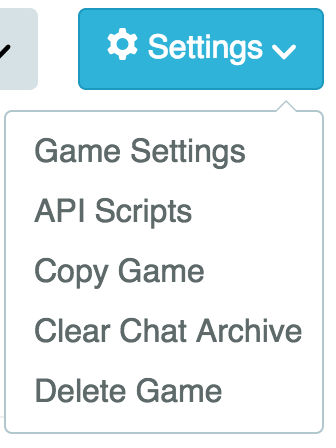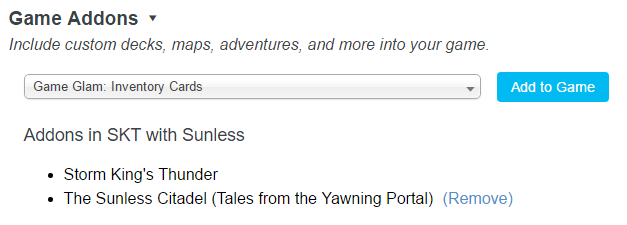Difference between revisions of "Game Management"
From Roll20 Wiki
Kristin C. (Talk | contribs) (→Content) |
Kristin C. (Talk | contribs) m (→Looking for Players) |
||
| Line 103: | Line 103: | ||
===Looking for Players=== | ===Looking for Players=== | ||
[[File:GameDetails Menu LookingForPlayers.png|thumb]] | [[File:GameDetails Menu LookingForPlayers.png|thumb]] | ||
| − | The Looking for Players menu allows a game's Creator to create or manage a [[Looking for Group|Looking for Group listing]]. Adding their game to Roll20's game directory will allow other Roll20 users to find and apply to join it. You must include some basic information about your game in order to list it, including the type of game that you'll be playing and the date and time of the next game to be played.<br style="clear:both;" /> | + | The Looking for Players menu allows a game's Creator to create or manage a [[Looking for Group|Looking for Group listing]]. Adding their game to Roll20's game directory will allow other Roll20 users to find and apply to join to it. You must include some basic information about your game in order to list it, including the type of game that you'll be playing and the date and time of the next game to be played.<br style="clear:both;" /> |
| + | |||
===Game Settings=== | ===Game Settings=== | ||
[[File:GameDetails Menu Settings.png|thumb]]The Settings menu provides several options for the game. The game's Creator can access all of these options, while Promoted GMs have limited access. Players only have access to the ‘’’Leave Game’’’ option detailed below.<br /> | [[File:GameDetails Menu Settings.png|thumb]]The Settings menu provides several options for the game. The game's Creator can access all of these options, while Promoted GMs have limited access. Players only have access to the ‘’’Leave Game’’’ option detailed below.<br /> | ||
Revision as of 05:26, 22 January 2018
Contents |
My Games Page
The My Games page, you can join games, create games, manage the games you are a part of. It is accessible either by clicking on the Games option on the Site's main navigation bar or clicking on the My Games option from the Games drop-down menu when you hover your mouse there.
1. Game Search
Across the top of the My Games page is a search bar. If you have a large list of games, this search bar will filter your Game List based on either Tags or Keywords used by the games you've created and the games you are a player of.
2. Game List
The bulk of the page is taken up by the Game List, which shows all the games you can access. Each listed game shows several pieces of information:
- Click the Game Title to be taken to the Game Details page.
- The Game Image will also take you to the Game Details page.
- Launch Game will take you straight into the tabletop for the game.
- Player Icons are listed for each game, showing you who else plays that game.
- The Last Played On date tells you when last the game was in session.
- Games created by you have a Creator badge.
- Games you are a Co-GM on have a GM badge.
- Games you are a player in are unadorned.
3. Buttons
At the top right are a collection of buttons for creating, copying, and adding games to your Game List.
- + Create New Game takes you through the game creation process to set up a new game.
- Access the Dev Server takes you to the Developer's Server, a Pro subscription perk.
- Copy from Dev takes you to a page that lets you copy a game from the Developer Server to the Production Server, a Pro subscription perk.
- Find a Group takes you to the Looking for Group Tool, so you can find more games to join.
4. My Tags
On the right edge is the My Tags box lists all the tags you have defined in decreasing order by how many games have them. You can click a tag to instantly filter the list down to the games that include that tag.
Game Details Page
Each game you create in Roll20 has its own dedicated Details Page. This is where player invites can me managed as well as changing any of the game’s settings. Before they hop into the VTT, this is also the first page new players see after accepting an invite to a game. From this page, players can keep track of in-between session content, such as the next game session's date as well as asking questions and starting discussions via the game’s dedicated private forum.
Inviting and Managing Players
On the right hand side of this page is where you can invite and manage the players who will join your game. Within a single game, there are three different roles that a Roll20 user can assume:
Creator
The game’s Creator is the Roll20 user who originally created the game. There is only ever one Creator for a Roll20 game. They have complete control over all of the game's settings and any subscription perks (Dynamic Lighting, F/X Tool, API Scripts, etc…) that the game can benefit from is based on what the creator’s account is currently subscribed as. Likewise, content such as Game Addons must be bought on the Creator’s account in order for them to be added to the game.
The Creator’s profile image and name is highlighted in purple in the upper right corner of this page. General user stats such as their account creation date and collective hours played are also listed. Clicking on either their name or their profile image will navigate to their Profile Page.
Player
Anyone else who joins the game will be listed as a Player. This section is listed right underneath the Creator in light grey. Players who join the game will be listed in this section with their profile icon followed by their name underneath. Their order are listed chronological by when they first joined the game.
GM
The Creator of the game can promote one or more Players in a game to the role of GM. A GM is granted access to alter, add, and delete most of the game's content within Roll20 as well as access a couple of features from the Game Details Page. For this reason, the Creator should practice discretion when promoting Players to this role so these privileges are not abused. A GM, like the Creator, will load into the game on the VTT in GM Mode rather than Player Mode.
A GM has access to the following:
Within the VTT
- Full access to all Page Layers
- Create, Modify, and Delete Pages
- Place images and tokens to the Tabletop from their personal image library (not the Creator's library)
- Assign and edit tokens
- Create handouts and characters, assign their view and edit permissions
- Move the Player Ribbon to different Pages
- Add, Remove, and Play music from the Jukebox
- See GM Whispers and Rolls in Chat
- Create Macros and Token Actions
- Modify Dynamic Lighting on a Page if the game's Creator is a paid Roll20 subscriber
- Access to all in-game options on the Settings Tab in the VTT except the Transmogrifier
Outside the VTT
- Invite Players (anyone can share the unique join link to the game)
- View and Edit API Scripts (Creator must be a Pro Subscriber)
- Manage the game's private forum, including sinking and deleting posts
A promoted player will have a blue “GM” tag added to the upper left of their profile icon in the Player List.
Inviting, Promoting, and Removing Players From a Game
Inviting Players
At the top of the light grey Players section is an Invite Players button. Clicking on this opens a dialog box that allow you to send invites out via email adresses, view pending invitations, and also list the game’s unique join link URL that you can copy and send to friends so they can join the game directly.
Promoting and Demoting Players
As the game’s creator, you have two options available to you when you hover your mouse over a player’s icon or name:
- ‘’’Promote to GM/Demote to Player’’’: This will elevate a player to GM Status or demote a GM back to player status. This option changes depending on the current status of the player.
Removing a Player From the Game
- ‘’’Kick from Game’’': This will remove the Player from the game and change the unique join link URL of the entire game. This will prevent the Player from attempting to rejoin with the previous join link.
Selecting either of these two options will cause the page to reload to process the new changes.
Managing Your Game
The rest of this page covers information and settings for the game. Most of these options can only be altered by the game’s Creator.
Game Icon
At the top of the Game Details page is the Game Icon, which is an image used to represent your game in the Game List and Looking For Group Listing (if enabled). This image also helps convey the game’s theme to your players when they join it. To set the image, either drag the desired image to this section, or click the Choose a File... button to be prompted to find an image file on your computer. This uploaded image will be added to your Art Library. Once one is added, you can change the image to something else by hovering your mouse over this area and clicking the Change Image link that appears.
Game Name
The Game Name is used to identify your game in the Game List and Looking For Group Listing (if enabled).You can change the Game Name at any time by clicking the name to edit it. Once you are satisfied with the change, you can click the Save button.
Launch Game
Clicking on the pink ‘’’Launch Game’’’ button will launch the Game on the Roll20 Virtual Tabletop.Content
The Content Button has two menu options available when clicked: Chat Archive and External Journal.
The Chat Archive will open a new window that displays the entire chat history of the game. There is a button in the top right that Hide Whispers in the chat log. Players can only see Whispers and GM rolls they were originally a participant of.
External Journal Access is available for games where its Creator is a paid subscriber. This option redirects to a new page where GMs can view all journal entries for unarchived Characters and Handouts within the game. Players also have access and can view any Characters or Handouts they have control permissions of within the game. Only the Bio & Info tab of a character is accessible from the External Journal. An individual's Character Sheet or Attributes and Abilities tabs can only be accessed within the VTT.
Looking for Players
The Looking for Players menu allows a game's Creator to create or manage a Looking for Group listing. Adding their game to Roll20's game directory will allow other Roll20 users to find and apply to join to it. You must include some basic information about your game in order to list it, including the type of game that you'll be playing and the date and time of the next game to be played.
Game Settings
The Settings menu provides several options for the game. The game's Creator can access all of these options, while Promoted GMs have limited access. Players only have access to the ‘’’Leave Game’’’ option detailed below.Game Settings
This option displays the Game Settings Page.
API Scripts
This option will give the game’s Creator and GMs access to the API Script Editor. The game's Creator must be a Pro subscriber for this feature to be available.
Copy Game
This option allows the creator to create a duplicate of the current game on their account. They can rename the duplicate, change its tags, and decide which elements you want carried over: Players and Player Settings (Including Macros), Pages, Decks and Rollable Tables, Chat Log, Journal (Characters & Handouts), Jukebox Playlist, or the Game Forums. Currently, the character sheet will default to None during a copy, so you’ll want to select the sheet you need in order to view the sheet in the copy. When you have everything designated for the duplicate, click the blue “I'm ready, Create Game!” button.
Clear Chat Archive
This option PERMANENTLY delete the entire archived chat history from the game.
Delete Game
This option opens a up a dialog box to confirm the Creators’ decision to delete the game.
Roll Back Game
The Creator must have a Pro subscription to have access to this feature. Between the hours of 4 and 6 AM PST, a save state is made for every game on Roll20. Seven days’ worth of save states are kept on file before they’re rewritten with new save states. Pro users have the ability to roll back their game to any save state available from the past seven days to correct any drastic mistakes made to their game.
To commit a rollback, click “Roll Back Game.” This brings up a dialog box that allows you to choose the date of the save state you would like to roll your game back to. Select the date and click on the pink “Rollback” button to initiate the rollback process. This may take a minute or two, but once finished, the Game Details Page will prompt you when the rollback has successfully completed. This cannot be undone; however, you can choose to roll back again to a later save states you have available if you discover you’ve rolled back too far.
Leave Game
This option is only visible to Players and GMs invited to the game. Once a player leaves a game, they no longer have access to the game and it will no longer show up in their Games Page.
Game Information
The next section below the Launch and Settings buttons shows specific information about the current game, from what system will be played to when it will be played.
Playing
This field shows what system(s) the Creator has specified are being played in this game. The Creator can edit the Playing list by clicking into the text field and choosing popular systems from the drop-down that appears.
If you don't see your preferred system listed, choose Other Games. This list of available popular games are updated on a quarterly basis and if a game system surges in popularity, it gets added. Only the first 2 systems alphabetically will be shown in the Looking For Group Listing, so be sure to only choose two if you'll be using that system to find players.
Next Game Will Be
This field is where the game Creator can set the date and time for the game’s next session. The time is automatically converted to the viewer's local timezone.
Note: The time selector uses a 12-hour clock rather than a 24-hour clock. 12:00 AM is used to indicate Midnight (00:00) while 12:00 PM is used to indicate Noon.
Game Description
This is where a Game's Creator can add a blurb advertising what to expect out of the game, adventure flavor text, or provide pre-requisites for potential players. This free-form text field is for anything the Creator feels would be convenient for the Players to know.
To edit the description, simply click inside the text field to activate it and change the text to suit your needs. You can use Markdown formatting to customize the look of your description text. When you are satisfied with your changes, click the ‘’’Save Changes’’’ button.
Game Addons
Game Addons, unlike Marketplace modules, are smaller content packages that are meant to enhance your existing games such as: custom card decks, maps, single encounter adventures and more. Once bought, these content packages are available via a dropdown menu in the Game Addons section of the Game Settings Page. Select the one you wish to add and click on the blue Add to Game button beside the drop down menu. When a Game Addon is appended to the game, it will be added to a bulleted list underneath the "Addon in [Title of Current Game]" list. This list is shown underneath the addon drop down menu and the blue Add to Game button.| Adding an Addon more than once will overwrite the previous version of that addon you currently have added to your game. You will lose any changes you may have made, but this will also assists a GM who made any edits by mistake and wish to revert back to the original copy of the Addon. |
Removing Addons
To remove any Game Addon content you've added to a game, you will need to delete it manually from inside the launched game. If you ever delete a Game Addon unintentionally, remove the Addon from the Addon List on the Game Details Page, then add it back in again.
Game Discussion Forum
Each game has an exclusive mini forum. It behaves exactly like the public Roll20 forums. Everyone in the game can create their own threads on this forum and also make replies. The game's Creator and GMs all have access to the Sink, Sticky, and Delete commands on individual posts within this forum.
The Sink command will keep a thread at the bottom of the forum regardless of activity.
The Sticky Command will pin the thread to the top of the forum.
The Delete command will remove the post's text from view by those who are not the Creator or GMs. Deleting the first post in a thread will remove the entire thread from the Game Discussion Forum.
This section of the Game Details Page only shows the ten most recent posts from the Game Discussion Forum. To see the entire discussion forum, click on the ‘’’View All Posts >’’’ link at the bottom of the Page.
Clicking on the + Post New Topic button redirect you to full Game Discussion Forum so that you can begin drafting a new forum thread.





